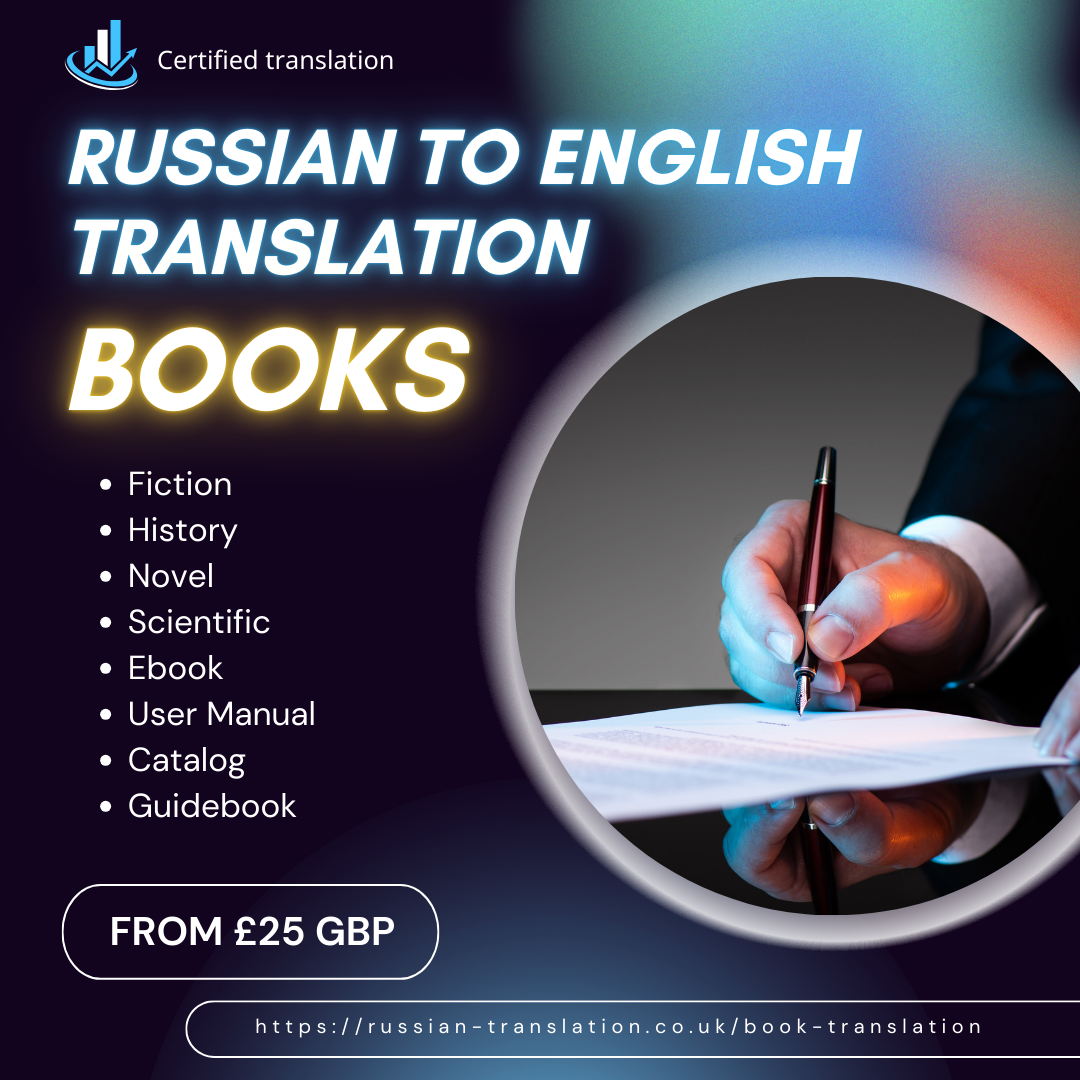Offering the Service of Russian to English Book Translation in the UK
In the global literary landscape, the translation of books from Russian to English plays a crucial role in bridging cultural gaps and enriching the English-speaking world with diverse narratives and perspectives. The United Kingdom, with its rich literary heritage and cosmopolitan readership, is an ideal market for such translations. This article explores the various aspects of offering Russian to English book translation services in the UK, including the types and genres of books translated, the target audience, the translation process, and the qualifications required for authorized translators.
Russian translation services in the UK
Russian to English translation of book in the UK
Russian certified translation of certificates in the UK
Russian document translation services in the UK
Russian to English transation services in the UK
Russian to English translation of documents in the UK
Russian translation of contracts in the UK
Russian translation services in the UK
Russian to English translation of book in the UK
Russian certified translation of certificates in the UK
Russian document translation services in the UK
Russian to English transation services in the UK
Russian to English translation of documents in the UK
Russian translation of contracts in the UK

Types and Genres of Books Translated
The scope of Russian to English translation is vast, encompassing a wide array of literary and non-literary works. Here are some of the key types and genres of books that are commonly translated:
- Literary Fiction: This includes classic and contemporary novels, short stories, and novellas. Notable authors such as Fyodor Dostoevsky, Leo Tolstoy, and Anton Chekhov have had their works translated, and contemporary authors like Elena Ferrante and Mikhail Shishkin continue to attract international attention.
- Non-Fiction: Biographies, memoirs, historical accounts, and philosophical treatises are among the non-fiction genres translated. These works provide insights into Russian history, culture, and thought.
- Poetry: Russian poetry, with its rich tradition and profound emotional depth, is a significant area of translation. Poets like Alexander Pushkin, Anna Akhmatova, and Boris Pasternak have had their poems translated into English.
- Children's Literature: Books for young readers, including fairy tales, educational books, and children's novels, are also translated to introduce English-speaking children to Russian literature.
- Science Fiction and Fantasy: Genres that have gained popularity in recent years, with authors like Arkady and Boris Strugatsky and Sergey Lukyanenko contributing to the science fiction and fantasy canon.
- Academic Texts: Scholarly works in fields such as history, linguistics, sociology, and political science are essential for academic exchange and research.
Russian translation of Passport in the UK
Russian translation of Diploma in the UK
Russian translation of Birth Certificate in the UK
Russian translation of Marriage Certificate in the UK
Russian translation of Divorce Certificate in the UK
Russian translation of Death Certificate in the UK
Russian translation of Diploma in the UK
Russian translation of Birth Certificate in the UK
Russian translation of Marriage Certificate in the UK
Russian translation of Divorce Certificate in the UK
Russian translation of Death Certificate in the UK

Who May Need the Translation of Books from Russian to English in the UK
Several groups of individuals and organizations in the UK may require Russian to English book translations:
- Publishers: Literary and academic publishers often commission translations to expand their catalog and reach a broader audience.
- Educational Institutions: Universities, colleges, and schools may need translations for teaching purposes, research, and curriculum development.
- Libraries and Archives: Public and private libraries may acquire translated works to diversify their collections and provide access to Russian literature.
- Individual Readers: Enthusiasts of Russian literature and culture, as well as students and researchers, may seek translations for personal reading and study.
- Cultural Organizations: Institutions promoting cultural exchange and international understanding, such as embassies, cultural centers, and non-profit organizations, may support translation projects.
Process and Procedure of Translating a Book from Russian to English
The process of translating a book from Russian to English involves several stages, each requiring meticulous attention to detail:
- Selection of Material: Identifying the book to be translated, considering its literary merit, cultural significance, and potential audience.
- Translator Selection: Choosing a qualified translator with expertise in the specific genre and style of the book.
- Translation: The translator works on the initial draft, ensuring fidelity to the original text while adapting it to the English language and cultural context.
- Editing and Proofreading: A professional editor reviews the translation for accuracy, coherence, and stylistic consistency. This stage may involve multiple rounds of revisions.
- Copyediting: Ensuring grammatical correctness, punctuation, and formatting according to publishing standards.
- Review by Native Speakers: Native English speakers may be consulted to verify the naturalness and readability of the translation.
- Final Review: The final draft is reviewed by the author or a subject matter expert to ensure that the translation captures the essence of the original work.
- Publication: The translated book is prepared for publication, including cover design, typesetting, and marketing.

Who Can Be Authorized to Translate a Book from Russian to English in the UK
Translating a book from Russian to English requires a high level of linguistic proficiency, cultural understanding, and literary sensibility. Authorized translators typically possess the following qualifications:
Offering Russian to English book translation services in the UK is a valuable endeavor that enriches the literary landscape and fosters cultural exchange. By understanding the types and genres of books translated, identifying the target audience, following a rigorous translation process, and ensuring the qualifications of authorized translators, this service can make a significant contribution to the global literary community. Whether for publishers, educational institutions, libraries, or individual readers, the translation of Russian literature into English opens doors to new worlds of thought and imagination.
- Formal Education: A degree in translation studies, linguistics, or a related field is often required. Many translators also hold advanced degrees in specific subject areas.
- Certification: Professional certifications, such as those offered by the Chartered Institute of Linguists (CIOL) or the American Translators Association (ATA), can enhance credibility and professionalism.
- Experience: Proven experience in literary translation, with a portfolio of published works or translations for reputable publishers.
- Cultural Competence: A deep understanding of both Russian and English cultures, including historical, social, and literary contexts.
- Language Proficiency: Native-level fluency in English and advanced proficiency in Russian, with the ability to convey nuances and subtleties of the original text.
- Literary Sensibility: A keen sense of style, tone, and narrative flow, ensuring that the translation reads as a cohesive and engaging work in its own right.
Offering Russian to English book translation services in the UK is a valuable endeavor that enriches the literary landscape and fosters cultural exchange. By understanding the types and genres of books translated, identifying the target audience, following a rigorous translation process, and ensuring the qualifications of authorized translators, this service can make a significant contribution to the global literary community. Whether for publishers, educational institutions, libraries, or individual readers, the translation of Russian literature into English opens doors to new worlds of thought and imagination.
Featured articles:













